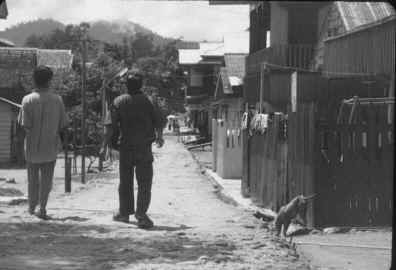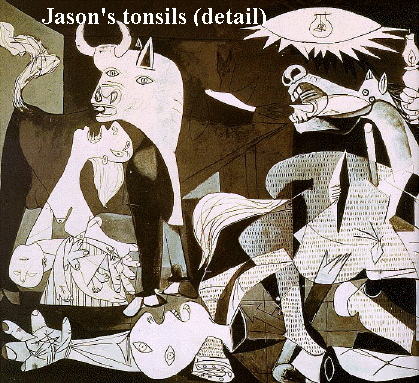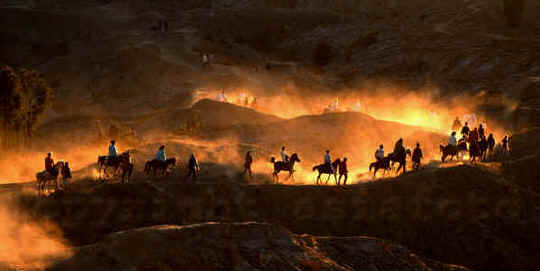|
Dispatch
from Borneo:
Chapter 3. Re-integration to
global capitalism - after the Kalimantan Jungle
|
| The
public boat to Long Bagun has not yet arrived (12:30) so it looks like
we'll be spending a second night in Tiong Ohang.
Spend the day chatting, reading, eating and generally chilling in the
warm sun. It's starting to feel eerily like a holiday.
Briefly consider doing my laundry, but reject this for the more
sensible alternative of buying a shirt and three pairs of underpants, XL
of course. Model the underpants in the cafe for the remaining porters,
with a view to impressing them with my commitment to cultural
assimilation. The next stage would be to dry them on my head - as Udi
Lokang did at the camp one day - but my commitment wanes and this must
wait until another day.
 Tiong Ohang is something of a Wild West town. Home to much transient
labour, its main raison d'etre is to act as a staging post for the
lucrative but dangerous birds' nest business. Nests sell for around $350 a
kilo, which a good worker can harvest in a day. Four of our porters are
staying here to seek their fortune - Darmudiono, an engineer by background
and now a scruplously honourable entrepreneur; Fast Eddy Kodok, now acting
like a rich man with his newly-acquired walkman; Bloody Tono, his futile
conversations with Jason consisting of little in the way of discernable
communication (example: T: "Speak English Coca Cola!"; J:
"Coca Cola"; T (triumphantly): "Aaahhh!"); and the
silent but efficient Pius. Tiong Ohang is something of a Wild West town. Home to much transient
labour, its main raison d'etre is to act as a staging post for the
lucrative but dangerous birds' nest business. Nests sell for around $350 a
kilo, which a good worker can harvest in a day. Four of our porters are
staying here to seek their fortune - Darmudiono, an engineer by background
and now a scruplously honourable entrepreneur; Fast Eddy Kodok, now acting
like a rich man with his newly-acquired walkman; Bloody Tono, his futile
conversations with Jason consisting of little in the way of discernable
communication (example: T: "Speak English Coca Cola!"; J:
"Coca Cola"; T (triumphantly): "Aaahhh!"); and the
silent but efficient Pius.
The trade is not without danger, and by one account in any given month one worker is likely to die, falling from a tree or from the
treacherous rocks which give access to the caves where many of the nests
are found. Given the big money and the limited supplies, the work is
highly regulated and this leads to illegal harvesting, sometimes by armed
poachers. Darmudiono has brought a rifle for protection, and I guess some
of the deaths arise from violent encounters between poacher and regulated
worker. For those here, the lure of the riches outways such an apparently
remote risk, but for some this choice will prove costly.
|
Next
day there is still no public longboat to Long Bagun, so we give up and
charter a boat until as far downriver as we can, about an hour. From here
we find another, larger, boat which can take on the rapids downstream.
When we reach the rapids we can see why the larger boat is necessary -
they are fierce and wet! We reach Long Bagun just before dusk and immediately board the houseboat that will be our lodgings for the night. I
settle down midway between Eric's and Jason's tonsils, but this may prove
irrelevant given that the bloody engine will be on all night to pump water
out and avoid us sinking to meet a watery death in our sleep. |
I'm beginning to see why Dave Nott put Indonesia as his
favourite country. The people here are genuinely very warm, both to us as
rather esoteric (and rich) outsiders, but also, as far as I can see,
amongst themselves. They have an easy physicality about them and have -
partly through necessity no doubt - developed what I understand are
informal but effective social security systems through their family and
social structures. In these economic conditions a relatively high level of
risk is ever-present, and most Indonesians seem at ease with this. For
example, the other day I saw a group of young kids playing on a wooden
platform held a few metres above the ground by rickety stilts and with a
good number of gaps in the planks, easily big enough for one of them to fall
through. This would have most parents I know in apoplexy, but here
children seem to be given responsibility for themselves at an early stage,
and from what I could see they respond well to this. Perhaps the
acceptance of risk in part stems from an Islamic acceptance that we have
only limited control over our lives, and that our fate is largely in the
hands of Allah, quantum uncertainty and chaotic unpredictability. But
perhaps it also stems from a basic faith in human nature and in our
ability to cope, in however flawed a way, with what life throws our way.
Such faith is certainly an advantage when being driven by a sleep-starved
and possibly inebriated public bus driver on what the locals generously
call "roads" in these parts.
|
Ten
hours' journey in the houseboat today, taking us from Long Bangun to
Tering. An uneventful trip which I used to re-create my journal for the
last couple of weeks, as I seem to have left it at our losmen in Tiong
Ohang. From Tering we have a lovely drive in the back of a small truck to
the long house at Eheng. This is a wooden affair on stilts, maybe 70m x
10m, split lengthwise into a common hallway and individual family rooms.
No-one is expecting us, but Alex knows one of the families and is
confident that we'll be invited to stay for the night, and indeed this
proves to be the case. A warm reception awaits us, especially Alex, with
much laughter and exchange of news. We share our room with a family of
around four adults and three children, but it's hard to know who lives
where amid the various bouts of human traffic throughout the evening.
Jason and Eric both elect to sleep in the communal hallway, to share
the dark secrets of their deep throats with the souls of those condemned
to suffer the eternal night of sleepless woe. I thank the universe for its
mercy.
|
 Awake
after a wonderful night's sleep (what mercy!) to begin a bargaining
session for a machete. If Red Ken and Johnnie Two Jags don't manage to
sort out London's Tube soon, this could be an increasingly useful tool for
forging a path in rush hour on the Northern Line once my transition back
to UK life is complete. I end up paying around $65 for a beautiful piece
made of steel, wood and bone. Its heavier blade will be particularly
suited to the special rigours of Moorgate and Bank in early morning.
Awake
after a wonderful night's sleep (what mercy!) to begin a bargaining
session for a machete. If Red Ken and Johnnie Two Jags don't manage to
sort out London's Tube soon, this could be an increasingly useful tool for
forging a path in rush hour on the Northern Line once my transition back
to UK life is complete. I end up paying around $65 for a beautiful piece
made of steel, wood and bone. Its heavier blade will be particularly
suited to the special rigours of Moorgate and Bank in early morning.
News today that violence has spread to Pangkalanbun, very close to the
area for our Orang Utan leg in a few days. Rumours are that four are dead
and 83 arrested, with a number of buildings also burnt down. We'll get
further news in Samarinda, both from newspapers and from Intrepid, but we
may need to develop a Plan B if the unrest is as serious as these rumours
suggest.
A long journey by houseboat takes us to Mura Muntai for the night. We
are now within a day's striking distance of Samarinda, which means email,
shower, clean sheets and casual gangland murder. If we die there, we will
die clean.
|
 As we
arrived at our losmen last night, I felt relief when I saw that all the
rooms were basic but single - to sleep, to sleep, perchance to sleep... At
01:30, my relief was shattered as the sound which I had thought forever
banished from my life pierced my soul like a rampant chainsaw in the
savage nunnery of the night. As my sightless fingers probed the texture of
the wall beside me, I realised that less than 3mm of poorly constructed
hardboard stood between me and that ignoble heaving inhumanity in the next
room. I decamped to the corridor, mosquito coil and deet for protection,
and slept fitfully until the amplified call to Friday payer woke me a
couple of hours later at around 4am. Another night in Kalimantan. As we
arrived at our losmen last night, I felt relief when I saw that all the
rooms were basic but single - to sleep, to sleep, perchance to sleep... At
01:30, my relief was shattered as the sound which I had thought forever
banished from my life pierced my soul like a rampant chainsaw in the
savage nunnery of the night. As my sightless fingers probed the texture of
the wall beside me, I realised that less than 3mm of poorly constructed
hardboard stood between me and that ignoble heaving inhumanity in the next
room. I decamped to the corridor, mosquito coil and deet for protection,
and slept fitfully until the amplified call to Friday payer woke me a
couple of hours later at around 4am. Another night in Kalimantan.
|
In the morning we take some lovely low boats across Lake Wachamakolit,
vegetation somehow resplendent in the lake itself despite being mostly
submerged in the high waters. A couple of hours in a swish 4WD and - mercy
me - we reach Hotel MJ in Samarinda. It is a wonderful sight, its marble
floor and A/C breathing comfort into our jungle-scarred bodies and minds.
A long shower and ritual debearding, followed by a four-hour email session
to re-enter the world I had been a part of until three weeks ago. I
discover that global capitalism remains intact.
News of the unrest is now clear-cut and we cut our scheduled visit to
the orangutan reserve. Joanne has spoken with the local operators in the
area and they are advising - strongly - not to come. They themselves are
staying indoors as much as possible to avoid the danger in the streets, as
reports are confirmed that Dayaks are hunting down Madurese and using in
some cases extreme violence when encounters take place. How to reconcile
this tragic situation with my glowing account of the Indonesian people
from my personal encounters?
|
![]()

